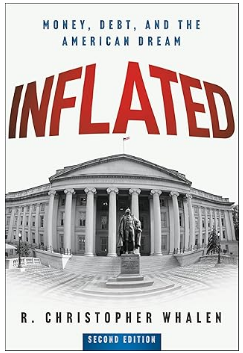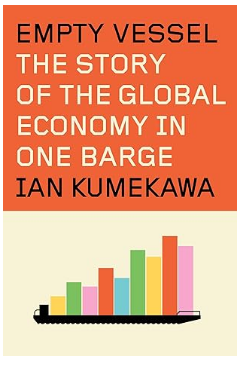 ● Our Dollar, Your Problem: An Insider’s View of Seven Turbulent Decades of Global Finance, and the Road Ahead
● Our Dollar, Your Problem: An Insider’s View of Seven Turbulent Decades of Global Finance, and the Road Ahead
Kenneth Rogoff
Essay by author via The Economist
To paraphrase a common saying: it ain’t what you don’t know that kills you. It’s what you think you know that ain’t so. Nothing could better describe the numb-skulled thinking behind the havoc that President Donald Trump and his trade Rasputin, Peter Navarro, have wrought on the global economy. Among the likely casualties will be the supreme status of the dollar. Although the greenback will almost certainly remain the world’s dominant currency for at least a couple more decades, it will probably fall several notches. Expect the yuan and the euro to encroach on the dollar in the legal economy. Cryptocurrencies will do the same in the underground economy, which is roughly a fifth of global GDP. Reduced market share will mean higher interest rates on long-term dollar debt, and a weakening of the effectiveness of American financial sanctions, among other problems.
 ● Inflation: A Guide for Users and Losers
● Inflation: A Guide for Users and Losers
Mark Blyth and Nicolò Fraccaroli
Review via Publishers Weekly
“Inflation has multiple causes and just as many manifestations,” according to this measured study. Blyth (coauthor of Angrynomics) and Fraccaroli (coauthor of Austerity vs. Stimulus)—economists at Brown University and the World Bank, respectively—explain that while moderate inflation is “generally a sign of a growing economy,” “bad inflation” occurs when supply shocks compel corporations to raise prices in anticipation of further shocks, leading workers to demand higher wages that companies pay for by further boosting prices. Evaluating shortcomings of the most common explanations for inflation (corporate greed, government spending, supply shocks, and tight labor markets), the authors point out, for instance, that attempts to pin recent inflation on government stimulus during Covid are difficult to square with data showing that the amount of stimulus a given country spent bears little correlation with how much inflation it experienced. Rather, the causes of and proper remedies for inflation vary over time and place, the authors argue, noting that differences in wealth and reliance on Russian oil played decisive roles in why price controls successfully tamed inflation in Spain but not Hungary in the 2020s.
 ● Generative AI for Trading and Asset Management
● Generative AI for Trading and Asset Management
Hamlet Jesse Medina Ruiz and Ernest P. Chan
Summary via publisher (Wiley)
Generative AI for Trading and Asset Management is an essential guide to understand how generative AI has emerged as a transformative force in the realm of asset management, particularly in the context of trading, due to its ability to analyze vast datasets, identify intricate patterns, and suggest complex trading strategies. Practically, this book explains how to utilize various types of AI: unsupervised learning, supervised learning, reinforcement learning, and large language models to suggest new trading strategies, manage risks, optimize trading strategies and portfolios, and generally improve the productivity of algorithmic and discretionary traders alike. These techniques converge into an algorithm to trade on the Federal Reserve chair’s press conferences in real time.
 ● The Best of Jonathan Clements: Timeless Advice for a Financial Life Well Lived
● The Best of Jonathan Clements: Timeless Advice for a Financial Life Well Lived
Jonathan Clements
Essay by Wall Street Journal columnist Jason Zweig
After Jonathan shared his grim prognosis, some of his fans suggested establishing a journalism award named after him. “The world has enough journalism awards already,” Jonathan responded with a laugh. “Too many, in fact.”
He knew exactly what he wanted instead: to launch Roth IRA accounts for young people from poor families who have never invested before, with the objective of turning them into lifelong savers.
After months of effort, Jonathan’s fans and friends have put together a program we hope can do just that.
A wonderful anthology of his writing for the Journal, “The Best of Jonathan Clements: Classic Columns on Money and Life,” has just been published. (I’m one of the editors and wrote the introduction.)
All proceeds from the book will go to fund the Roth IRA project, which we’re calling the Jonathan Clemens Getting Going on Savings Initiative. Contributions to a Roth individual retirement account aren’t tax-deductible, but its growth is tax-free and withdrawals can be as well.
 ● Inflated: Money, Debt and the American Dream (2nd ed.)
● Inflated: Money, Debt and the American Dream (2nd ed.)
R. Christopher Whalen
Summary via publisher (Wiley)
In the newly revised second edition of Inflated: How Money & Debt Built the American Dream, veteran investment banker, author, and Chairman of Whalen Global Advisors LLC delivers the latest installment of his concise history of the United States’ monetary system, putting contemporary financial phenomena like inflation and high housing costs into context. You’ll learn to understand how issues like the public debt and the rise of cryptocurrencies can be understood through the lens of how the United States government exploits debt and the monetary system to fund its operations.
 ● Surviving Wall Street: A Tale of Triumph, Tragedy, and Timing
● Surviving Wall Street: A Tale of Triumph, Tragedy, and Timing
Scott L. Bok
Summary via publisher (Wiley)
Surviving Wall Street: A Tale of Triumph, Tragedy and Timing portrays the dramatic transformation of the investment banking business in recent decades through the tumultuous saga of one firm (Greenhill & Co., a specialist in mergers and acquisitions) and one man (Scott Bok, the longtime CEO of that firm). Written in the style of an adventure tale, this book is also a “coming of age” story for a naive young man who came to Wall Street—as thousands like him do each year—and managed to grab a front-row seat for a period of epic change.
 ● Another Way: Building Companies That Last…and Last…and Last
● Another Way: Building Companies That Last…and Last…and Last
Dave Whorton and Bo Burlingham
Summary via publisher (Harvard Business Review Press)
From the inner sanctum of Silicon Valley and short-term capitalism comes the story of a VC who lived it, then left it and found a better way to build great companies. Dave Whorton was John Doerr’s associate partner at high-flying Kleiner Perkins Caufield & Byers during Silicon Valley’s big shift, when he witnessed the VC industry pivot from a proven forty-year playbook of managing risk to something much more aggressive: “get-big-fast.” Don’t worry about profitability. Cash out and find another venture.
 ● Empty Vessel: The Story of the Global Economy in One Barge
● Empty Vessel: The Story of the Global Economy in One Barge
Ian Kumekawa
Review via The Wall Street Journal
Thanks to Donald Trump, the world has been getting a crash course in antiglobalism from a populist-right perspective.
Perhaps the singular merit of Ian Kumekawa’s “Empty Vessel” is to remind us that, before President Trump steamrolled the news cycle with tariffs, globalism was already a well-established whipping post on the populist left.
Mr. Kumekawa, a historian at Harvard, traces the history of a container ship, which he frames as a symbol of the acceleration (until recently) in world trade and of the economic changes, such as deindustrialization in the West, he claims it has fostered.
Please note that the links to books above are affiliate links with Amazon.com and James Picerno (a.k.a. The Capital Spectator) earns money if you buy one of the titles listed. Also note that you will not pay extra for a book even though it generates revenue for The Capital Spectator. By purchasing books through this site, you provide support for The Capital Spectator’s free content. Thank you!